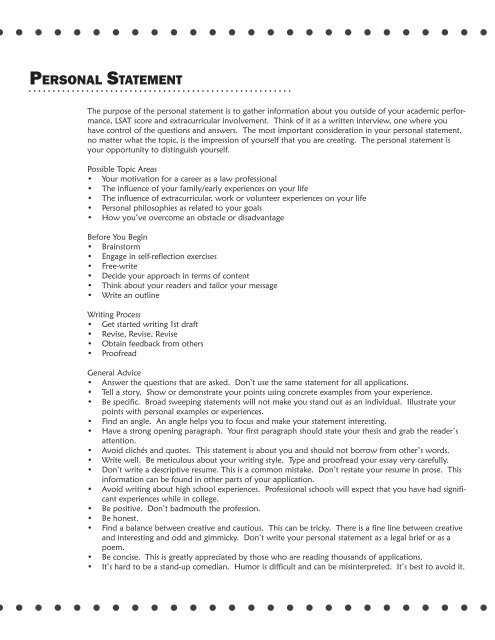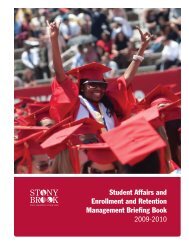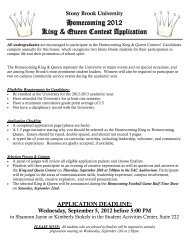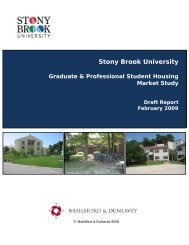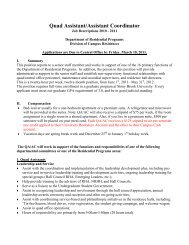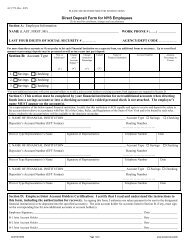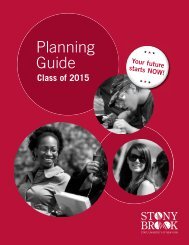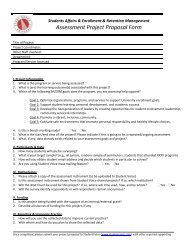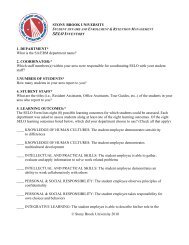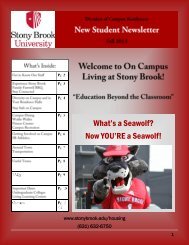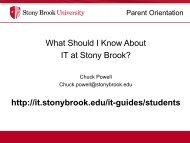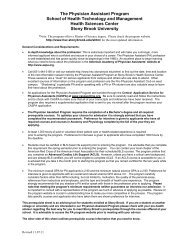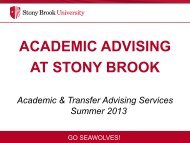PreLaw Guide - Student Affairs - Stony Brook University
PreLaw Guide - Student Affairs - Stony Brook University
PreLaw Guide - Student Affairs - Stony Brook University
Create successful ePaper yourself
Turn your PDF publications into a flip-book with our unique Google optimized e-Paper software.
Personal Statement<br />
The purpose of the personal statement is to gather information about you outside of your academic performance,<br />
LSAT score and extracurricular involvement. Think of it as a written interview, one where you<br />
have control of the questions and answers. The most important consideration in your personal statement,<br />
no matter what the topic, is the impression of yourself that you are creating. The personal statement is<br />
your opportunity to distinguish yourself.<br />
Possible Topic Areas<br />
• Your motivation for a career as a law professional<br />
• The influence of your family/early experiences on your life<br />
• The influence of extracurricular, work or volunteer experiences on your life<br />
• Personal philosophies as related to your goals<br />
• How you’ve overcome an obstacle or disadvantage<br />
Before You Begin<br />
• Brainstorm<br />
• Engage in self-reflection exercises<br />
• Free-write<br />
• Decide your approach in terms of content<br />
• Think about your readers and tailor your message<br />
• Write an outline<br />
Writing Process<br />
• Get started writing 1st draft<br />
• Revise, Revise, Revise<br />
• Obtain feedback from others<br />
• Proofread<br />
General Advice<br />
• Answer the questions that are asked. Don’t use the same statement for all applications.<br />
• Tell a story. Show or demonstrate your points using concrete examples from your experience.<br />
• Be specific. Broad sweeping statements will not make you stand out as an individual. Illustrate your<br />
points with personal examples or experiences.<br />
• Find an angle. An angle helps you to focus and make your statement interesting.<br />
• Have a strong opening paragraph. Your first paragraph should state your thesis and grab the reader’s<br />
attention.<br />
• Avoid clichés and quotes. This statement is about you and should not borrow from other’s words.<br />
• Write well. Be meticulous about your writing style. Type and proofread your essay very carefully.<br />
• Don’t write a descriptive resume. This is a common mistake. Don’t restate your resume in prose. This<br />
information can be found in other parts of your application.<br />
• Avoid writing about high school experiences. Professional schools will expect that you have had significant<br />
experiences while in college.<br />
• Be positive. Don’t badmouth the profession.<br />
• Be honest.<br />
• Find a balance between creative and cautious. This can be tricky. There is a fine line between creative<br />
and interesting and odd and gimmicky. Don’t write your personal statement as a legal brief or as a<br />
poem.<br />
• Be concise. This is greatly appreciated by those who are reading thousands of applications.<br />
• It’s hard to be a stand-up comedian. Humor is difficult and can be misinterpreted. It’s best to avoid it.


